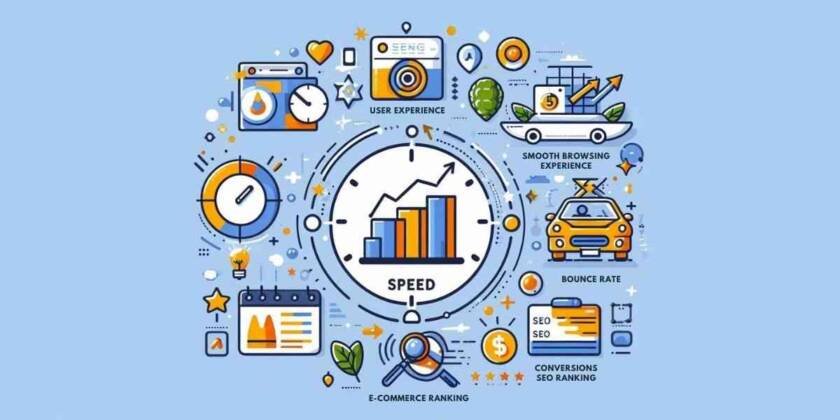In today’s fast-paced digital world, website speed plays a crucial role in user experience and overall success. A slow-loading website can frustrate users, leading to high bounce rates, lower conversions, and decreased search engine rankings. By optimizing website speed, businesses can improve customer satisfaction, boost engagement, and enhance SEO performance. This guide will walk you through essential techniques to enhance website speed and ensure a seamless user experience.
Why Website Speed Matters
Website speed directly impacts user satisfaction, engagement, and business success. Here’s why it’s critical:

- User Experience (UX) is Paramount: Faster websites provide a smoother browsing experience, making users more likely to stay.
- Bounce Rate: Slow-loading sites drive visitors away. Studies show that pages loading within 2 seconds have the lowest bounce rates.
- Conversions: Faster websites have higher conversion rates, whether for e-commerce sales, sign-ups, or other actions.
- SEO Ranking: Google considers site speed as a ranking factor, meaning slow websites can lose visibility in search results.
Key Performance Indicators (KPIs) to Track
To measure and improve your website speed, monitor these KPIs using the following tools:
- Google PageSpeed Insights: Provides a performance score and actionable recommendations for desktop and mobile.
- GTmetrix: Offers detailed reports, including load time, waterfall charts, and suggestions for optimization.
- Pingdom: Analyzes speed, server response time, and overall page size.
Core Website Speed Optimization Techniques
1. Image Optimization
- Compress Images: Use TinyPNG, ImageOptim, or Squoosh to reduce file size without losing quality.
- Use Proper Formats: WebP and JPEG 2000 offer better compression than traditional JPEG and PNG.
- Implement Lazy Loading: Load images only when they enter the viewport using the
loading="lazy"attribute.
2. Minify HTML, CSS, and JavaScript
- Remove unnecessary spaces, tabs, and comments to reduce file sizes.
- Use tools like UglifyJS and CSSNano for automatic minification.
3. Leverage Browser Caching
- Enable caching to store static files locally, reducing repeated downloads.
- Modify your
.htaccessfile or server settings to set expiration times for assets.
4. Reduce HTTP Requests
- Combine multiple CSS and JavaScript files into one to decrease load time.
- Use sprite sheets for icons and images to reduce requests.
5. Use a Content Delivery Network (CDN)
- CDNs like Cloudflare and Akamai distribute static content across multiple global servers, ensuring faster load times for all users.
6. Optimize Server Response Time
- Use fast, reliable hosting with good server performance.
- Reduce the number of database queries and optimize backend processes.
7. Prioritize Above-the-Fold Content
- Load essential content first to improve perceived performance.
- Use asynchronous loading (
asyncordefer) for non-critical scripts.
8. Minimize Redirects
- Excessive redirects increase load time. Ensure direct navigation paths without unnecessary forwarding.
Mobile-Specific Considerations
- Responsive Design: Ensure your website adapts seamlessly to different devices and screen sizes.
- Mobile-First Indexing: Google prioritizes mobile versions of websites for indexing and ranking.
- AMP (Accelerated Mobile Pages): Consider using AMP to speed up mobile browsing experiences.
Advanced Techniques
- HTTP/2 Protocol: Allows multiple requests to be processed simultaneously, reducing latency.
- Preload Critical Resources: Use
<link rel="preload">to prioritize loading essential assets. - Code Splitting: Break large JavaScript files into smaller chunks for faster execution.
Testing and Monitoring Performance
- Run regular speed tests using PageSpeed Insights, GTmetrix, and Pingdom.
- Monitor performance metrics using Google Analytics to see how speed impacts user behavior.
- Use real-time monitoring tools like New Relic or Lighthouse for continuous improvements.
Example Code Snippets
Lazy Loading Images (HTML Example)
<img src="image.webp" loading="lazy" alt="Optimized Image">Minify CSS (Command Line Example)
npm install -g clean-css-cli
cleancss -o style.min.css style.cssConclusion
Website speed optimization is essential for enhancing user experience, boosting engagement, and improving search rankings. By implementing these strategies, businesses can reduce bounce rates, increase conversions, and provide a seamless browsing experience for users across all devices. Regular testing and monitoring will ensure continued optimization and growth.
Need professional website optimization? Contact IxD Hub for expert solutions!
FAQ
1. What is a good website loading speed?
A loading time of under 2 seconds is ideal, with anything beyond 3 seconds increasing the risk of high bounce rates.
2. Does website speed affect SEO?
Yes, Google considers site speed a ranking factor, impacting your search visibility.
3. How can I test my website speed?
Use tools like Google PageSpeed Insights, GTmetrix, and Pingdom for accurate speed analysis.